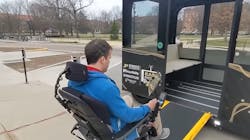USDOT names three winners of Inclusive Design Challenge
The U.S. Department of Transportation (USDOT) named the first, second and third place winners of its first Inclusive Design Challenge. The challenge launched more than two years ago to spur innovation in automated vehicle accessibility.
The $5 million Inclusive Design Challenge awarded its first place $1 million prize to Purdue University, the second-place prize of $700,000 was awarded to AbleLink Smart Living Technologies and the third-place prize of $300,000 was awarded to the University of Maine.
The multi-stage program began in January 2020 with a Request for Information where applicants submitted their projects in writing. In January 2021, USDOT awarded $3 million to 10 semifinalists in the challenge to develop prototypes of their design with the final winners selected from these projects.
“Automated vehicles have the revolutionary potential to help seniors and people with disabilities get around more easily—but we must ensure that accessibility is part of the conversation from the very beginning,” said U.S. Transportation Secretary Pete Buttigieg. “That’s why [USDOT] started the Inclusive Design Challenge, and we’re thrilled to award these inaugural winners funding to help advance their innovative ideas and improve transportation for people with disabilities.”
The Inclusive Design Challenge was created by USDOT to promote innovative designs to enhance mobility options for people with physical, sensory and cognitive disabilities, encourage collaboration and explore new designs and technologies. USDOT explains the program draws on the expertise of the disability community, researchers, advocates and entrepreneurs, tapping into their knowledge and creativity to promote greater access and shape the future of mobility.
The top projects were announced during a hybrid in-person and virtual event at USDOT to celebrate the 32nd anniversary of the Americans with Disabilities Act of 1990.
More about the winning projects
Purdue University secured the top $1 million prize with its project Efficient, Accessible and Safe Interaction in a Real Integrated Design Environment for Riders with disabilities (EASI RIDER).
The team developed an automated vehicle that incorporates universal design features to accommodate people with physical and sensory disabilities. The vehicle features an in-floor ramp design, an automatically deploying “smart ramp,” an automated wheelchair docking system and an on-board user-interface that provides features catering to a wide range of disabilities. The product assists users in locating an automated vehicle, boarding and exiting the vehicle, securing themselves and their mobility aids and interacting with the vehicle via touch screen and voice control.
AbleLink Smart Living Technologies was awarded the $700,000 second place prize for its project, WayFinder ADS – Enabling Independent Use of Autonomous Vehicles by Individuals with Cognitive Disabilities and others with Special Needs.
The WayFinder ADS System is a comprehensive mobile application that connects users with automated vehicles to allow them to travel independently to predetermined destinations. The application includes a cloud program that would allow a family member or travel trainer to track the individual while they are traveling in and interacting with the vehicle. The application also includes educational programs to orient users on the use and function of automated vehicles in a safe, virtual environment.
The University of Maine (UMaine) was awarded $300,000 for its third place project, Autonomous Vehicle Assistant (Ava): Ride-hailing and localization for the future of accessible mobility.
Ava is a smart phone app designed to assist passengers with visual impairments and older adults with trip planning, traveling to pick-up locations and boarding vehicles. The app allows users to hail an autonomous vehicle and then get to that vehicle while avoiding any obstacles in their path using a visual user interface, natural language text to speech and augmented reality. Researchers utilized GPS, LiDAR, Gyroscope and Accelerometer technology; real-time computer vision via the smartphone camera; machine learning; artificial intelligence; and other software.
“This is exciting national recognition of one of the outstanding, ongoing research and development initiatives from our VEMI Lab,” said UMaine President Joan Ferrini-Mundy. “Such innovation addressing needs, including those for equity and inclusion, and providing critical advancements in technology are among our R1 research university achievements.”
USDOT says it will continue to engage with the Inclusive Design Challenge participants as they advance their innovations.
----
Resources:
More on Purdue University’s EASI RIDER project: https://youtu.be/gw0JJhihNE4
More on the AbleLink Smart Living Technologies’ project: https://youtu.be/jUzbwuOQFw8
More on the University of Maine’s Ava project: https://youtu.be/syIlBlFSgSo
About the Author

Mischa Wanek-Libman
Group Editorial Director
Mischa Wanek-Libman is director of communications with Transdev North America. She has more than 20 years of experience working in the transportation industry covering construction projects, engineering challenges, transit and rail operations and best practices.
Wanek-Libman has held top editorial positions at freight rail and public transportation business-to-business publications including as editor-in-chief and editorial director of Mass Transit from 2018-2024. She has been recognized for editorial excellence through her individual work, as well as for collaborative content.
She is an active member of the American Public Transportation Association's Marketing and Communications Committee and served 14 years as a Board Observer on the National Railroad Construction and Maintenance Association (NRC) Board of Directors.
She is a graduate of Drake University in Des Moines, Iowa, where she earned a Bachelor of Arts degree in Journalism and Mass Communication.
